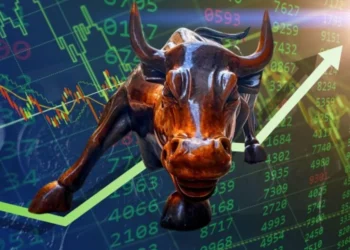Profit taking investors at the financial sector of the market have besieged the local bourse as the government nears the conclusion of its debt restructuring program which has the financial sector at the forefront.
The news caused the share price of GCB Bank PLC- the largest independent financial institution in Ghana to fall for the second time within a week. Just three days ago, GCB Bank share price depreciated by GHS0.39, plummeting from GHS3.9 to settle at GHS3.51, representing a decline of 10 percent.
The latest loss came on mid-week trading session when the banking sector giant GCB Bank Limited (GCB) suffered 0.28 percent share price depreciation.
Meanwhile, out of the 14 GSE listed equities that participated in Wednesday’s trading session, the session ended with only one loser, namely GCB Bank PLC.
GCB closed its trading day (Wednesday, February 8, 2023) at GHS3.50 per share on the Ghana Stock Exchange (GSE), recording a pesewa drop from its previous closing price of GHS3.51. GCB began the year with a share price of GHS3.94 but has since lost 11.2 percent off that price valuation, ranking it 35th on the GSE in terms of year-to-date performance.
GCB Bank is the third most traded stock on the Ghana Stock Exchange over the past three months (Nov 7, 2022 – Feb 8, 2023). GCB has traded a total volume of 991,028 shares valued at GHS 3.69 million over the period, with an average of 15,731 traded shares per session. A volume high of 500,349 was achieved on February 8, 2023 for the same period.
GCB Bank Limited is currently the ninth most valuable stock on the GSE with a market capitalization of GHS 928 million, which makes up about 1.44 percent of the Ghana Stock Exchange equity market.
At the end of the trading session on the Ghana Stock Exchange, a total of 504,823 shares, corresponding to a market value of GHS 1,757,083.99, were traded.
GCB Bank recorded the highest volume of 500,349 traded shares, followed by MTN Ghana (2,406), CAL Bank (1,278) and Ghana Oil Company (572).
GCB Bank PLC’s Performance Affects Major Indices
The performance of GCB Bank PLC affected the major indices including the financial index and the composite index. The GSE Financial Stocks Index (GSE-FSI), which measures the banking sector stocks and insurance, decreased by 0.02 percent to settle at 2,005.35 points, making it a week-on-week loss of 1.51 percent, a month-on-month loss of 2.04 percent, and a year-to-date loss of 2.3 percent.
Moreover, benchmark GSE Composite Index (GSE-CI) also pared 0.25 (-0.01%) points to close at 2,405.09 points, representing a 1-week loss of 0.26 percent, a 4-week loss of 1.38 percent, and an overall year-to-date loss of 1.59 percent.
Meanwhile, weeks since the Finance Minister announced a move to default on Ghana’s domestic debt by persuading creditors to exchange their current bonds for new, significantly lower value versions, he has been able to secure agreement with only a handful of corporate bond holders which include the banks and other capital market operators.
The finance minister has since cautioned that non-participation or a lower-than-expected turnout for the DDEP will prolong efforts to resolve the current economic crisis. However, with investors being sensitive to the situation, the financial sector stocks of the local equities market is likely to face headwinds in the coming days when the program is fully rolled out.
READ ALSO: My Father Didn’t Deny Me The Opportunity To Make Music – Okyeame Kwame





















